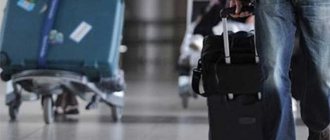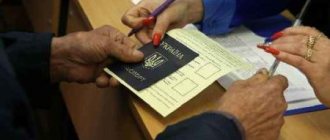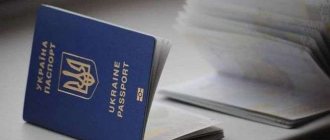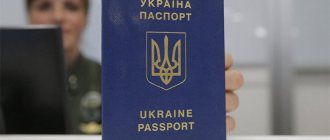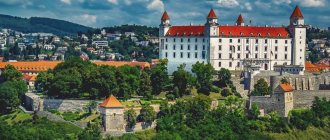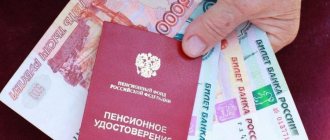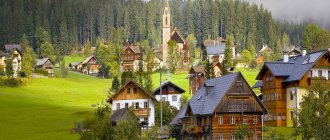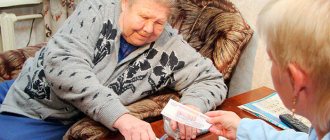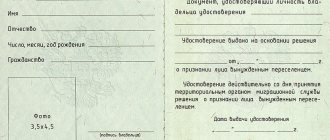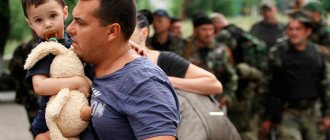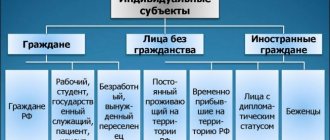Obtaining refugee and forced migrant status in Russia
The application must be completed in legible handwriting and in black or blue ink. If a person wishing to obtain this status has more than one citizenship and nationality, then each of them must be indicated. If other people were included in the form, they must be present during registration. The applicant must undergo photographic and fingerprint registration.
- such a person and his family could be threatened or persecuted on the territory of his country on the basis of various religious, political or linguistic reasons;
- perhaps there was a persecution of a person from the country, and his reluctance to live there anymore.
Who can participate in the resettlement program?
First of all, potential migrants can be those who have the right to be called a compatriot. These are persons belonging to the following categories:
- have Russian citizenship, but permanently live abroad;
- temporarily or permanently reside in Russia (including refugees);
- in former times they lived in Russia, and then their place of residence became one of the CIS countries;
- have Russians among their direct ancestors;
- those who during the years of Soviet power lived on the territory of the USSR and had a Soviet passport;
- emigrants, both those who have received citizenship of another country and those who do not have it;
- foreign nationals whose roots are of Russian origin.
If a person receives migrant status, then no one has the right to separate him from his family, and everyone who is connected to him by family ties will be able to move to the Russian Federation, including even grandparents.
Having Russian roots is not a sufficient quality; the country cannot load itself with additional ballast in the form of disabled elderly people. We need healthy people of full working age, so additional conditions in 2021 consist of the following requirements:
If, during the process of checking the identity of a migrant, it is established that this person has been seen in connections with extremists or terrorist entities, then an immediate refusal will follow. There is one more circumstance: the regions receiving migrants have developed their own programs, which may include additional requirements. An applicant for resettled status will be accepted if his candidacy satisfies all the requirements, including the regional program.
- Moscow and region:
+7-499-350-97-04 - St. Petersburg and region:
+7-812-309-87-91 - Federal:
+7-800-511-69-34
What does migrant status give?
Having received the status of a migrant, you can count on employment in the chosen region without obtaining a permit or purchasing patents. Ukrainian citizens can also receive lifting aids that will help them settle in Russia. Money is paid twice: immediately after relocation and after 1.5 years.
After relocation you can:
- work in your specialty;
- study at Russian universities;
- use the services of public clinics;
- arrange a child for school, kindergarten;
- receive maternity capital;
- apply for loans, including mortgages;
- renew your pension.
If you are sure that your profession will be in demand in the chosen region, then it makes sense to try your luck and submit a package of documents to participate in the program.
The main advantage of this project is, of course, large allowances - up to 240 thousand rubles (read about what payments are due to immigrants in the Russian Federation here). But there are so many applicants for participation that refusals still happen quite often.
How rational is it for Ukrainians to participate in this event?
If you constantly use Russian in everyday life, have relatives in the Russian Federation or received education here, then the move can be very successful. It is also ideal if you have long-term experience working in a Russian company or have your own business in the Russian Federation.
The following may apply for a simplified procedure for obtaining citizenship:
- WWII veterans;
- disabled children;
- participants of the State program for migrants.
Before choosing a region to move to, it is advisable to study all the vacancies and perhaps even have an interview with a specific employer.
Important! Participation in the program allows you to obtain Russian citizenship not after 5 years of residence, but after six months to a year. In addition, you will also be able to offset many of the costs associated with moving.
What are the advantages of migrant status in the Russian Federation?
Federal legislation guarantees the minimum benefits that will allow a displaced family to settle down, find a permanent job, and find children. The main thing that is promised is:
- issuance of raise money;
- reimbursement of moving costs, taking into account the cost of transporting things and even visa expenses;
- payment for rental housing (only for the first time);
- payment of monthly benefits (until employment).
You won’t be able to get citizenship right away, but a temporary residence permit is guaranteed even if there are restrictions in the region. It is possible to obtain a residence permit and, in the future, citizenship.
It is also important that a migrant does not need a patent or special permission to be able to work. Otherwise, the life of persons with migrant status is very similar to the life of Russians themselves:
| Dear visitors! The site offers standard solutions to problems, but each case is individual and has its own nuances. |
| If you want to find out how to solve your particular problem, call toll-free ext. 504 (consultation free) |
- free education (not only general education, but also professional and higher education);
- the possibility of free services in medical institutions.
To live and work calmly under the peaceful skies of Russia - the dream of many emigrants from the RSFSR, can now freely become a reality.
How can Ukrainians legally live and work in Russia?
Over the past two years, the number of Ukrainians in Russia has increased significantly. Until this time, the majority of Ukrainian citizens were interested in working in Moscow, but now they are fleeing hostilities from the ATO zone.
Ukrainian refugees have several ways to legalize themselves in the Russian Federation and obtain the appropriate certificate. Each of them requires obtaining temporary registration and applying to the FMS. IDPs from the ATO zone have the following rights and opportunities:
- when crossing the state border and filling out customs documents, indicate the private nature of your visit to Russia. In this case, stay on the territory of our country is regulated by the legislation on foreign citizens. Work can only be obtained if quotas for attracting foreign forces are not used. To obtain employment, you must obtain an official permit or a labor patent;
- submit an application to recognize yourself as a refugee or forced migrant. While the application is being considered, foreigners are provided with accommodation in temporary centers, food and social assistance. A cash benefit is also paid, the amount of which may vary in different regions of the country. After the certificate is received, the foreign citizen is considered a refugee and acquires the rights provided for by federal law. He is provided with housing and work;
- obtain the status of a native speaker of the Russian language, the support program for which provides for simplified registration of a residence permit and citizenship of the Russian Federation;
- agree to the conditions offered by the program involving the resettlement of compatriots.
Many Ukrainians can claim the status of compatriots. This program has been in effect since 2006. Persons who become its participants have the opportunity to:
- receive financial assistance from the state in the amounts specified in the relevant resolution;
- claim reimbursement for moving expenses;
- receive free medical and other assistance from government organizations on an equal basis with all citizens of the Russian Federation;
- work for hire, while work for these citizens is provided outside the existing quotas;
- obtain Russian citizenship in a simplified manner;
- apply for housing or a housing certificate.
The program for the reception of compatriots is designed to help the Russian-speaking population of other countries move to Russia. In order to have such an opportunity, you must be born in the USSR or in Russia, and have close relatives among the citizens of the Russian Federation. Persons who decide to move to Russia as compatriots can only count on living in those regions of the Russian Federation that are participants in this program. Work in Moscow and the Moscow region is not available under this program, since this region is not included in the program participants.
If you want to obtain a refugee certificate, but do not know how to do it, then contact our lawyer. You can get a free consultation online or by phone.
The Russian government is looking for possible ways out of the current situation with displaced people from the ATO zone. Much work is being done in this direction. Today, a new state program is being developed that would help all refugees from the ATO zone settle in Russia.
Procedure
The order of actions of an applicant for Russian migrant status is as follows:
- choose a region for your future place of residence (it is worth taking into account the size of the allowance, amounting to 240 thousand rubles per person applying for status);
- study regional legislation on the issue of participation in the resettlement program;
- prepare documents – yours and those of all loved ones who will be moving;
- submit an application with all documents attached.
Next, you need to be patient and wait for the result, which can take up to 2 months. Having received the go-ahead, the applicant will receive a certificate of participation in the state program and acquire resettled status. This document gives the right to go to the point of your new deployment - the region of Russia you have chosen as your place of residence.
Who can become a participant in the program?
Federal Law No. 99, which regulates state policy regarding compatriots abroad, determines who can become a participant in the resettlement program for compatriots:
- Citizens born in the Soviet Union or Russia, as well as their descendants.
- Citizens living in the territory of any of the countries that were formerly part of the USSR.
- Citizens born abroad, but belonging to nationalities that traditionally live on the territory of the Russian Federation.
- Citizens who once emigrated from the Soviet Union.
Having “Soviet roots” to obtain citizenship under the program of resettlement of compatriots is not enough - it is important to simultaneously meet a number of other requirements:
- Age over 18 years.
- Legal capacity without restrictions. This requirement is controversial from a moral point of view, but quite fair: the state wants to make sure that it does not “put on its neck” new beneficiaries to “milk” the already deficit budget.
- Good knowledge of the Russian language – both spoken and written. Knowledge of the language is the key to painless adaptation of a migrant. Ukrainians, as a rule, know Russian at a high level, but for immigrants from the Asian republics of the former USSR this requirement is often a problem.
- Availability of all documents necessary to obtain a residence permit under the legislation of the Russian Federation.
Law No. 99 of 2021 establishes requirements for the qualifications, education and work experience of resettlers. If a compatriot from Ukraine cannot be useful to Russia and the specific region that invites him, he is not welcome in the Russian Federation.
Purpose of the program
In order for residents of Ukraine to be eligible for the resettlement program for compatriots in the Russian Federation, they must meet one of the following categories:
- be Russians who, due to various circumstances, were forced to stay outside their country for a long time and have Ukrainian citizenship;
- be persons who were its citizens before the collapse of the USSR;
- have a residence permit in Ukraine or live there as a stateless person, but at the same time be a former citizen of the Russian Soviet Federative Socialist Republic.
- Applicants for residence must be at least eighteen years of age.
- Applicants must be able to work.
- Immigrants must be fluent in Russian: be able to speak and write in it.
If forced refugees have in-demand working specialties and work experience in them, then this will be a significant help for them in finding employment in a new place of residence. A person who has acquired the status of a migrant has the right to take relatives with him. This category includes:
- wife or husband;
- children;
- parents;
- brothers, sisters and their children;
- grandparents of the relocating person.
All these categories of citizens upon arrival in Russia receive migrant status and can legally apply for Russian citizenship.
Stay options
For citizens of the DPR and LPR, the period of stay in Russia on a migration card is 180 days. Citizens of Donbass and residents of Ukraine must be legalized in one of the following ways:
- get a patent and get a job;
- become participants in the program for compatriots;
- apply for a temporary or permanent residence permit.
The most convenient way to continue staying in Russia for those who wish to stay in the country and obtain citizenship in 2021 is the State Program for Resettlement from Ukraine to Russia.
Relocation assistance
Refugees moving to Russia can count on help from our state. To do this, they should submit documents to the appropriate authorities according to the list below.
- Statement of desire to move to the Russian Federation for permanent residence.
- Copies of the passport of the migrant himself, as well as his family members entering Russia with him. In this case, you should have the originals of the submitted documents on hand - they will need to be presented.
- Copies of documents confirming education and work experience (as in the case of passports, originals will also need to be presented).
A person from among compatriots living beyond the cordon who wishes to move to our country must submit the necessary documents in Russian, and their translation must be certified by a notary. The resettlement program provides for the provision of certain benefits to newcomers. Such refugees who decide to move to Russia as part of the program for compatriots will be able to take advantage of certain benefits.
The program, within the framework of which compatriots are moving to Russia, provides for their settlement in those regions of the country that are interested in the influx of labor and for this purpose are ready to create the necessary living conditions for families and individual citizens coming there for permanent residence. Basically they are all located in the eastern half of the country.
To expand the number of regions intended for receiving migrants, the President of Russia issued a special decree, according to which persons entering our country under the program intended for compatriots can now choose the Stavropol Territory as a place of permanent residence. This region is attractive for refugees from Ukraine, as it is located close to it, and in addition, a fairly large number of immigrants from this country already live there.
Obtaining internal migrant status in Ukraine
In this case, they use government decree number 509 dated October 1, 2014. Based on this document, you can submit an appeal if you move from the ATO zone to territory controlled by Ukraine. Details are presented on the official website of the Ministry of Social Policy: vpo.gov.ua.
Pension for migrants
When moving from Donbass, Donetsk, Donetsk region, Lugansk, LPR and DPR to Zaporozhye, Kharkov, Lvov or other cities, you can count on a pension transfer. Recent news suggests that it is impossible to raise payments to a more decent level, so migrants have to continue working even when they are of retirement age.
Re-registration, which every forced migrant to Russia can do, involves visiting the Pension Fund at the place of new residence. There will be clear instructions for further actions, since the information in well-known Internet sources may not correspond to the real state of affairs at the time when re-registration is required for a forced or “ordinary” migrant.
Available options for assistance to displaced people in the Russian Federation
- moving to a new place of residence after registration;
- mandatory state duty for processing documents determining status;
- a one-time payment for settling into a new place;
- monthly payments in the absence of employment or income from a new place of work, activity, entrepreneurship;
- compensation for rental housing (for six months) until complete arrangement in a new place;
- payments to families (for six months) in which children do not go to general education institutions, until the persons fully obtain Russian citizenship;
- a one-time payment for accommodation for participants in the Voluntary Resettlement Program for Citizens of the Russian Federation.
the system of assistance to migrants works in Russia using the example of Ukraine, where not everything is calm today, from military clashes in the eastern regions to the unstable political situation in the country as a whole.
Help and benefits for refugees in Russia
In addition to filling out the application itself, citizens are required to fill out a survey form , which allows us to consider the reasons for leaving the country as fully as possible.
Those who crossed the border illegally can submit an application for refugee status only within 24 hours. After this period, citizens may be expelled from the Russian Federation.
What is necessary to obtain migrant status
- original documents confirming housing ownership;
- a statement from each family member renouncing the right of ownership;
- documents and their copies that prove the identity and relationship of all family members.
Refugees and internally displaced persons receive permanent housing in rare cases. You can count on receiving a housing certificate; for this you need to become a participant in the appropriate program. The law assigns the implementation of these programs to local budgets.
Evening schools for adults
Yuri Filonenko (Tyumen) Write directly to the websites of the President of the Russian Federation, the Federal Migration Service of the Russian Federation, the Ministry of Foreign Affairs of the Russian Federation, the Ministry of Internal Affairs of the Russian Federation. Same text. I'm serious. After such a line of complaints, the regional Federal Migration Service spoke to me in whispers. 1 hour
Alexey: The border is not closed, the movement of people in both directions, provided they have documents, occurs as usual. I traveled with four transfers. I arrived in Lipetsk, which I had chosen as my place of residence, at 4 am.
Attention!
Due to recent changes in legislation, the legal information in this article may be out of date! Our lawyer can advise you free of charge - write your question in the form below.
Russian Orthodox Church
The movement of Ukrainian refugees to Russia continues. “To date, 245 temporary accommodation centers have been deployed, housing 17,010 people, including 7,239 children. Additionally, seven mobile temporary accommodation centers with a capacity of 3,500 people have been deployed,” said the official representative of the Russian Ministry of Emergency Situations, Alexander Drobyshevsky. Forced migrants receive assistance from the dioceses of the Russian Orthodox Church from Rostov to Khabarovsk. Residents of Russia take some refugees into their homes.
“On TV they show only part of what is happening; in reality, everything is much more dramatic,” noted the press secretary of the Shakhty diocese, Ilya Sharkov. — The border of Ukraine with Russia passes through the territory of our deaneries, literally through people’s gardens. For example, in the Chertkovsky district: the summer kitchen is located in Ukraine, and the house is located on Russian territory. There is no border as such; sometimes we organize joint services with several Russian and Ukrainian parishes.” According to I. Sharkov, there are many immigrants from Ukraine on the territory of the Shakhty diocese, so the state cannot cope and asks the Church for help.
In the Donetsk and Novoshakhtinsk tent camps for refugees, camp chapels have been installed, where priests are on duty. The head of the department for cross-border cooperation of the Shakhty diocese, Archpriest Roman Ampliev, and the clergy of the diocese constantly travel to temporary accommodation centers, bring humanitarian aid and try to support people in every possible way. “The people are amazingly responsive,” adds I. Sharkov. “Everyone is like one family; believers are hosting complete strangers in their homes.”
In the Rostov-on-Don diocese, with the blessing of Metropolitan Mercury of Rostov and Novocherkassk, a fundraiser was organized for civilians in Ukraine. The diocesan department for charity and social service collects and delivers humanitarian aid to internally displaced persons. Starting from June 27, employees of the diocesan charity department organized a visit to the water park for two weeks for hundreds of Ukrainian refugees - children and adults temporarily living on the territory of the SFU dormitory in Rostov-on-Don. Also, more than two tons of food and household appliances were donated by employees of the Synodal Department for Charity and Social Service to citizens of Ukraine who are in temporary accommodation centers in the Rostov region.
“Now, when children hear the rumble of an airplane, they immediately rush under the bed. And we have to persuade them for a long time that there are no evil airplanes here,” said the grandmother of one of the children who lives in a church shelter for refugees in the village of Otradnoye near Voronezh. Here the refugees met with Metropolitan Sergius of Voronezh and Liskinsky, who presented gifts and 10 thousand rubles from the diocese to each of the 34 families living in the shelter. “We collect money, food, clothes. This is the contribution of the believing people of the land of Voronezh,” added Metropolitan Sergius.
“I know that most Moscow parishes in one way or another provide assistance to forced migrants from Ukraine,” says Archpriest Mikhail Potokin, chairman of the commission for church social services in Moscow. “I even know parishes where people gave entire houses to refugees. Recently, my assistant arranged for the family of the regent from Lugansk; they have five or six children. They even found a job for him: they were just looking for a regent in one of the churches near Moscow.” However, as Father Mikhail notes, in most cases people go to Moscow purposefully, with children and families, knowing in advance that they will be sheltered by relatives or friends.
In the Pyatigorsk diocese, with the blessing of Archbishop Theophylact of Pyatigorsk and Circassia, a database on refugee resettlement has been created: those wishing to provide shelter for residents of south-eastern Ukraine are asked to fill out a form and submit it to the nearest church. “Not only locals, but also residents of the Krasnodar Territory, Astrakhan, Oryol, Bryansk, Penza, Rostov, Tyumen, Tula and other regions offer their homes. Some add that, in addition to housing, they are ready to help with clothes and toys, and the mineral water plant in Essentuki promises homes and employment. Now two families have already turned to us for help, we are ready for further resettlement of refugees,” said Archpriest Sergiy Elantsev, head of the diocesan department for church charity and social service of the Pyatigorsk diocese. “Also, humanitarian aid is being collected at the Peter and Paul Church in Essentuki.”
“We are ready to receive and accommodate up to 40 people in the hotel building of the Vyksa Iversky Monastery,” said Sergei Matyugin, coordinator of charitable programs of the Vyksa diocese. “The monastery has a hotel with its own kitchen, there is also a monastery refectory nearby, and a therapist and psychologist comes to the refugees.” S. Matyugin emphasized that the main difficulty for immigrants is the long procedure for obtaining the necessary documents, without which it is impossible to work, even if there are corresponding proposals.
“We currently have two families from Ukraine in our care. Some are refugees from the Donetsk region; they are receiving humanitarian assistance. And his wife sent another man from Odessa to Khabarovsk to earn money and told him to look for a new place of work. Now we also help him in any way we can: with money, food,” said the head of the missionary department of the Khabarovsk diocese, Priest Vladimir Gasyukov.
“So far, several families have contacted us for clothing assistance,” noted press secretary of the Simferopol diocese Lyudmila Tikhomirova. “As far as we know, so far all refugees from southeastern Ukraine live in Crimea with relatives and friends.” With the blessing of Metropolitan Lazar of Simferopol and Crimea, a collection of humanitarian aid is taking place in every church of the diocese.
In Belgorod, on the territory of the Marfo-Mariinsky Convent, the collection of humanitarian aid for internally displaced persons from Ukraine continues. Everyone brings here food, baby food, clothes, household chemicals, baby clothes, diapers and other necessary things, which are delivered to the settlements where refugees are located.
More than 20 refugees who arrived from the south-eastern regions of Ukraine found shelter in the parish of the Kazan Icon of the Mother of God in Semikarakorsk in the Rostov region. The settlers were visited by the ruling bishop of the Volgodonsk diocese, Bishop Corniliy of Volgodonsk and Salsky. During the meeting, the refugees thanked Bishop Cornelius for the help provided and the warm welcome, reports the information department of the Volgodonsk diocese. Bishop Korniliy presented gifts with basic necessities and icons with the image of the Don Icon of the Mother of God to those who arrived from Ukraine. The clergy of the Volgodonsk diocese and parishioners of churches are doing everything possible so that forced migrants on the territory of Russia can receive support and kind participation in their future fate.
In his address to the entirety of the Russian Orthodox Church on June 17, Patriarch Kirill emphasized that “the Church cannot divide the one people of God on political, national, social or any other principle.” The Primate of the Church called on all Orthodox Christians to intense prayer and extreme feat during the period of “the ongoing fratricide that is blazing on the territory of Ukraine, claiming more and more lives.”
You can help forced migrants from the southeast of Ukraine on the website of the Don Metropolis.
Diakonia.ru/Patriarchia.ru
What documents are needed?
What documents are needed for the resettlement program for compatriots will become clear from the following list:
- Civil and foreign passports. You also need to submit copies of all pages of your civil passport.
- Certificate of residence.
- Work record book, education diploma, certificates - all these documents are necessary to confirm that the migrant is highly qualified as a worker.
- Identification documents of relatives and papers confirming family ties. For example, if a migrant took his wife with him, a marriage certificate will be needed.
- Two photos in 3*4 format.
- A copy of the temporary residence permit or residence permit (if the migrant previously lived in Russia).
- Completed application form and application. The application form can be downloaded from the following link: https://nuzhnaviza.ru/docs/zajvlenie_pereselenie_obr.doc.

